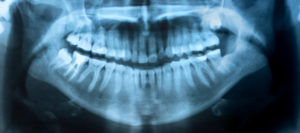What is bone loss
Bone loss occurs when the alveolar bone surrounding the tooth starts to degenerate.
The alveolar bone forms the ridges where the teeth sits. When a tooth is missing, these ridges start to degenerate vertically and horizontally.
Common reasons for bone loss
Tooth extraction or tooth loss
If an adult tooth is removed or become decayed, it can damage the jawbone that supports the tooth. Our natural teeth are attached to the jawbone. If any teeth are missing, the alveolar bone that anchors the teeth is no longer stimulated by the pressure of chewing and biting. The lack of stimulation will naturally result in bone deterioration since the bone is no longer needed. After a tooth extraction, most bone losses will occur rapidly within the first two years.
Periodontal diseases
Another major reason for bone loss is periodontal disease. Periodontal disease is a severe form of gum infection that gradually destroy the support of your natural teeth. The plaque is a sticky, colorless film composed mainly of food debris and bacteria that is built up below the gum line. If left unchecked, the plaque buildup will cause gum inflammation. Eventually, the gums will start to detach from the teeth. If periodontal disease is left untreated, the alveolar bone, periodontal ligament, or gingiva can be destroyed. Eventually, this will lead to bone loss and premature loss of teeth.
Dentures and bridges
After a tooth extraction, you may decide to replace the tooth with dentures or a bridge. These types of dental prosthesis are designed to replace the loss tooth, but they do not directly stimulate the underlying alveolar bone. For this reason, overtime, due to the lack of stimulation of the alveolar bone, the bone will start to resorb and deteriorate. A consequence of bone loss is that the denture or bridgework may not feel firmly placed.
Misaligned teeth
Another contributing factor to bone loss is misaligned teeth. Misalignment problems can lead to a situation in the mouth in which some teeth no longer have an opposing tooth structure.
The unimpeded tooth may break and cause damage to the underlying bone. If the misaligned teeth are not sufficiently stimulated over time, the bone may deteriorate since the normal pressure that is exerted on the opposite teeth from crunching and chew are no longer enough to stimulate the bone.
If you are concern about bone loss or may have questions about the health of your teeth, call California Dental Group at (800) 407-0161 to schedule your appointment.





